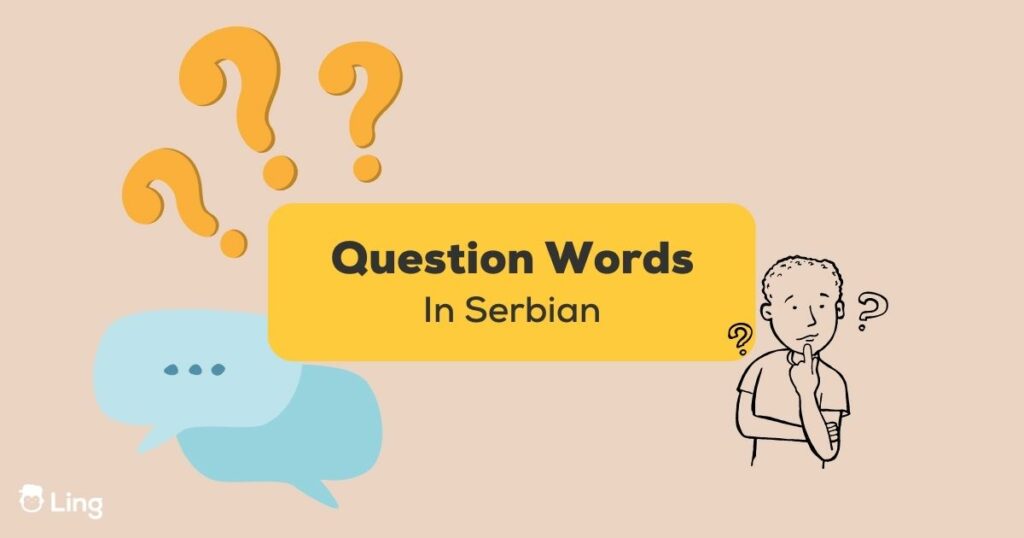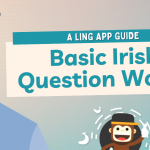Are you eager to learn Serbian and do not know where to start? Why don’t you start by learning a few question words in Serbian and start making questions in this incredible language?
Forming questions in English or your native language may seem easy because you’re already familiarised with some fundamental words to be able to question. Words like “What” or “Who” are already part of your daily life, so you may take them for granted. However, at some point in your life, you had to learn them, even if you can’t remember because you were too young and you were not paying attention to what you were learning. You just learned, and that’s it!
If you think that these words may not be some of the most important words you can learn in a language, then I have an exercise for you: go around one morning or one afternoon and pay attention to what you say and what others say to you, and count the times that words like “Where,” “What” or “Who” are used.
If you want a simpler exercise, just look at the last paragraphs of this text and see how many times I had to use them. I can count at least 3 times in much more than 200 words. That means that around 1,5% of my conversation with you was made by using these words.
To learn a new language, you have to start by covering the basics that will allow you to expand your knowledge and eventually gain fluency in the new language, and that’s why this should be one of your first steps into Serbian. If you want to explore some more themes before diving into question words in Serbian, check out our blog that covers a lot more about the Serbian language, like some methods on speaking Serbian, Serbian grammar, or valuable resources where you can learn Serbian. All these articles will definitely help you to master Serbian!
If you’re ready to learn some question words, then let’s skip the chatting and get our hands dirty!

Question Words In Serbian You Must Know
So, you want to form questions in Serbian but don’t know where to start, right? Well, you should start by learning these words and then use them to form your questions. These words will be very helpful for you to be able to express yourself in Serbian and eventually connect with other people!
Wh-Questions
These questions ask about a certain part of the sentence, eg., subject or object. In English, these questions are called ‘wh-questions’ since they start with a question word: who, what, which, etc.
In Serbian, such sentences start with question words that generally start with ‘k’, such as ko (who), koga (whom), koji (which/what), kada (when), kako (how), koliko (how much/how many). But also, we have šta (what), gde (when), zašto (why), čiji (whose).
The word order in these k-questions is: K-word – Verb- (Subject) – (Object) – (Anything Else) So, just like in English, these k-words occur at the front of the sentence.
Similar to English, a preposition can precede these K-words, as in:
Sa kime ideš u Srbiju? (With whom are you going to Serbia?)
Od koga dobijaš pisma? (From whom are you getting letters?)
You cannot split the preposition and the k-word, as is the case in English (‘Who are you going to Serbia with?’):
Kim ideš u Srbiju sa? (ungrammatical)
Koga dobijaš pisma od? (ungrammatical)
Who?
Whenever you want to ask somebody, who a certain person is, or who did that, you use the word “Who” (I’m already feeling dizzy by the number of times I used this word in a simple sentence). The best way to learn how to say these words is by watching them being used in sentences, so take a look at the table below and note a few examples.
| English | Serbian | Pronunciation |
| Who? | ко (Ko) | |
| Who did that? | Ко је то урадио? (Ko je to uradio?) | |
| Who are you? | Ко си ти? (Ko si ti?) | |
| Who is there? | Ко је тамо? (Ko je tamo?) |

Where?
Let’s keep on moving. The next word that you probably use at least once a day is “Where.” You use it when you want to ask someone where something is or where you should be going.
Why?
This is the simplest way you ask somebody why did something happen or why someone did what they did. Here is how to say “Why” in Serbian.
When?
If you want to know how to ask someone when the next train is coming, this is the part for you. Use the word Када? (Kada?) and people will definitely understand your request for “When?”.
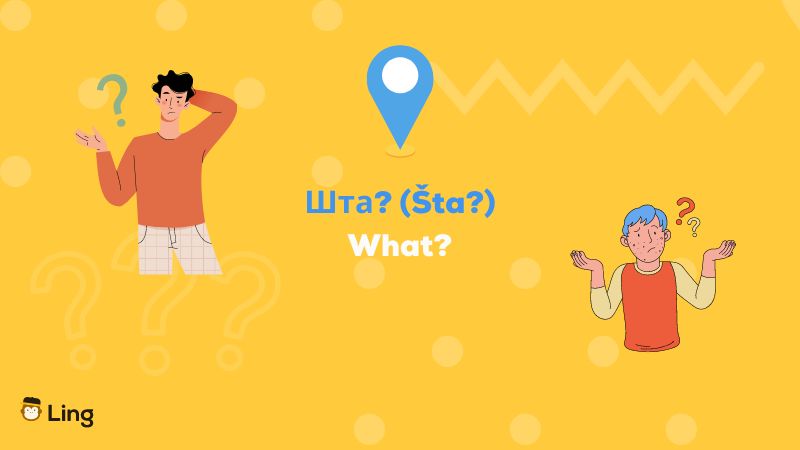
What?
Imagine this: your friend makes a decision, and you get really confused about it. What better word to express your surprise than to say Шта? (Šta?) and make your friend know that you’re confused about it.
How?
The last question word you should know is the word “How.” This word will be helpful if you need to ask your friend how to do something.
This was just a little taste of what you can learn in Serbian, and it will help you start forming your questions in this language. However, just learning these words still puts you a bit far from being able to have an entire conversation in Serbian. But don’t worry, that’s why I’m here to help you!
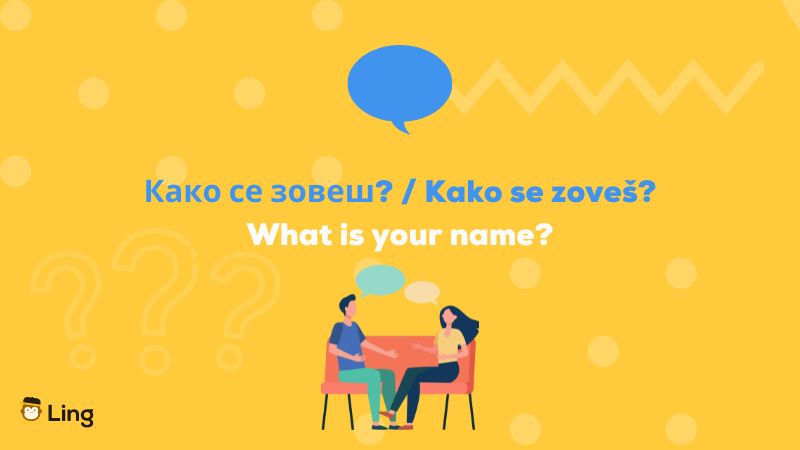
Questions In Serbian – More Examples
Below is a list of interrogative expressions and questions in Serbian placed in a table. Memorizing this table will help you add very useful and important words to your Serbian vocabulary.
| Serbian (Cyrillic / Latin) | English Translation |
| Где је он? / Gde јe on? | Where is he? |
| Зашто си тужна? / Zašto si tužna? | Why are you sad? |
| Како желите да платите? / Kako želite da platite? | How do you want to pay? |
| Могу ли да дођем? / Mogu li da doђem? | Can I come? |
| Да ли он спава? / Da li on spava? | Is he sleeping? |
| Да ли ме познајете? / Da li me poznaјete? | Do you know me? |
| Имате моју књигу? / Imate moјu knjigu? | Do you have my book? |
| Колико је велико? / Koliko јe veliko? | How big is it? |
| Могу ли Вам помоћи? / Mogu li Vam pomoći? | Can I help you? |
| Можете ли ми помоћи? / Možete li mi pomoći? | Can you help me? |
| Да ли говорите енглески? / Da li govorite engleski? | Do you speak English? |
| Колико је далеко? / Koliko јe daleko? | How far is this? |
| Како се зовеш? / Kako se zoveš? | What is your name? |
| Где живите? / Gde živite? | Where do you live? |
Question Sentences In Serbian
There are three types of question sentences in Serbian:
- Yes-no questions
- Wh-questions
- Alternative questions
Yes-No Questions
These are questions that require either a yes or no for an answer, as in:
Da li radite ovde? (Do you work here ?)
These are the two most common ways to ask such questions in Serbian:
1. Inserting “da li” at the beginning of the sentence:
Da li učiš srpski? (Do you study Serbian?)
Da li Luka radi? (Does Luka work?)
The word order in da li questions is: da li + (subject) + verb + anything else
As you can see, the subject is optional (hence, parentheses).
2. Inserting “li” immediately after the main verb or after the non-clitic, auxiliary verb.
Učiš li srpski? (Do you study?)
Jesi li radio? (Did you work?)
Hoće li Luka učiti srpski? (Will Luka study Serbian?)
The word order in “li questions” is: verb + li + anything else
Negative Yes-No Questions
Sometimes, a speaker may ask a question negatively, by negating the verb or the auxiliary:
Ne učiš srpski? (You don’t study Serbian?)
Nisi radio danas? (You didn’t work today?)
An alternative is to put the negative phrase: ‘zar ne’ (didn’t you/ don’t you) at the beginning of the sentence, as in these examples.
Zar ne učiš srpski? (Don’t you study Serbian?)
Zar nisi radio danas? (Didn’t you work today?)
Sentences like this express surprise.
Tag Yes-No Questions
These are questions that turn a positive declarative statement into the question, by inserting the tag negative phrase ‘zar ne’ (didn’t you/ don’t you), at the very end of the sentence. Just like in English:
Učiš srpski, zar ne? (You study Serbian, don’t you?)
Nisi radio danas, zar ne? (You worked today, didn’t you?)
So, we first have a regular declarative sentence, followed by ‘zar ne’.
Word Order In Indirect Questions
Besides the direct questions discussed above, we will now talk about the word order in indirect questions. Indirect questions are basically declarative sentences, except that in the subordinate sentence, the question words: ‘da li’ (whether) or k-words introduce the subordinate sentence.
Some examples:
Ne znam [da li je Luka došao.] (I don’t know whether Luka came)
Pitam se [kada će Luka doći.] (I wonder when will Luka come)
In these two examples, the indirect question is shown in brackets. In the first one, the indirect question starts with ‘da li’ (or yes-no phrase), and in the second one, it starts with the k-word “kada” (when).
Q: So, what is the word order in these two embedded indirect question sentences?
A: It is the same as indirect questions.
In the first one, the order is the same as in yes-no questions and in the second one, it is the same as indirect k-questions, discussed above.
As for direct k-questions, in indirect questions, a question word can be preceded by a preposition:
Ne znam [o kome ću pričati.] (I don’t know about whom I will talk.)
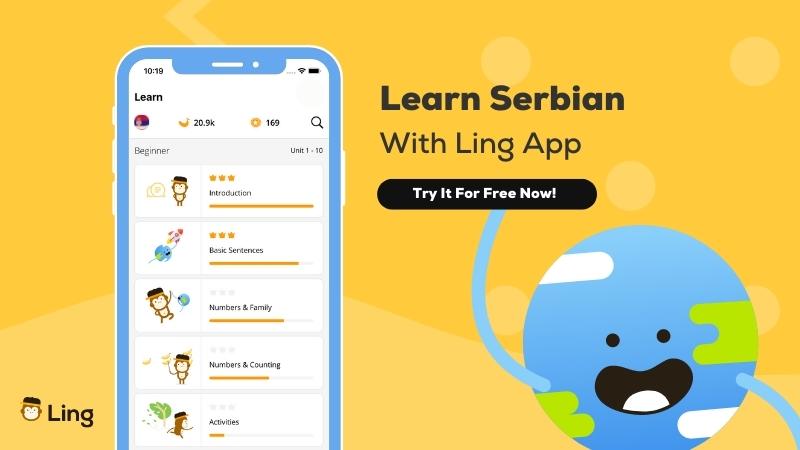
Come learn Serbian With Ling App
Ling app is a language learning app that will help you learn and speak fluently over 60 languages from all across the world, including Serbian. This application is available for iOS and Android and has 24/7 support for your most demanding needs to learn a new language.
With this application, you can learn at your own pace through games and puzzles that make the process of learning a new language a fun and engaging journey! To top it all off, we at Ling app ensure that all the information taught to you is accurate and relevant by having native language speakers review our lessons.
So what are you waiting for? Stop asking yourself Зашто? (Zašto? – Why?), come join us and many more people worldwide, and start learning Serbian!
